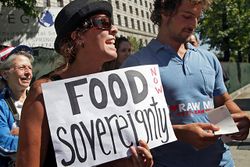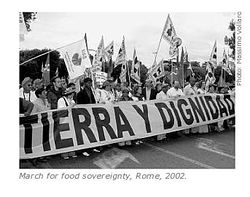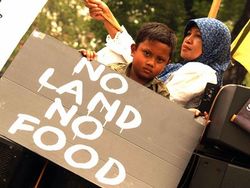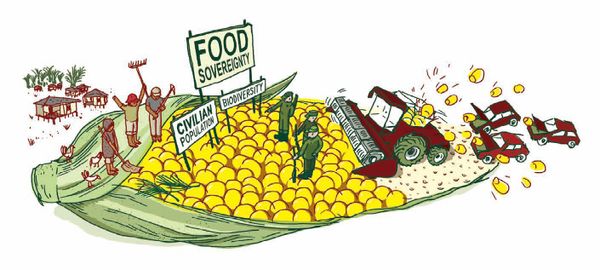Food Sovereignty
|
This article is part of the Food Rights Network, a project of the Center for Media and Democracy. Find out more here. |
Food Sovereignty is defined as:[1]
- "Food sovereignty is the right of peoples to define their own food and agriculture; to protect and regulate domestic agricultural production and trade in order to achieve sustainable development objectives; to determine the extent to which they want to be self reliant; to restrict the dumping of products in their markets, and; to provide local fisheries-based communities the priority in managing the use of and the rights to aquatic resources. Food sovereignty does not negate trade, but rather, it promotes the formulation of trade policies and practices that serve the rights of peoples to safe, healthy and ecologically sustainable production."
- - Statement on People’s Food Sovereignty” by Via Campesina et. al.
Contents
Seven Principles
Via Campesina’s Seven Principles Of Food Sovereignty are:
- 1. Food: A Basic Human Right
- Everyone must have access to safe, nutritious and culturally appropriate food in sufficient quantity and quality to sustain a healthy life with full human dignity. Each nation should declare that access to food is a constitutional right and guarantee the development of the primary sector to ensure the concrete realization of this fundamental right.
- 2. Agrarian Reform
- A genuine agrarian reform is necessary which gives landless and farming people — especially women — ownership and control of the land they work and returns territories to indigenous peoples. The right to land must be free of discrimination on the basis of gender, religion, race, social class or ideology; the land belongs to those who work it.
- 3. Protecting Natural Resources
- Food Sovereignty entails the sustainable care and use of natural resources, especially land, water, and seeds and livestock breeds. The people who work the land must have the right to practice sustainable management of natural resources and to conserve biodiversity free of restrictive intellectual property rights. This can only be done from a sound economic basis with security of tenure, healthy soils and reduced use of agro-chemicals.
- 4. Reorganizing Food Trade
- Food is first and foremost a source of nutrition and only secondarily an item of trade. National agricultural policies must prioritize production for domestic consumption and food self-sufficiency. Food imports must not displace local production nor depress prices.
- 5. Ending the Globalization of Hunger
- Food Sovereignty is undermined by multilateral institutions and by speculative capital. The growing control of multinational corporations over agricultural policies has been facilitated by the economic policies of multilateral organizations such as the WTO, World Bank and the IMF. Regulation and taxation of speculative capital and a strictly enforced Code of Conduct for TNCs [Trans-National Corporations] is therefore needed.
- 6. Social Peace
- Everyone has the right to be free from violence. Food must not be used as a weapon. Increasing levels of poverty and marginalization in the countryside, along with the growing oppression of ethnic minorities and indigenous populations, aggravate situations of injustice and hopelessness. The ongoing displacement, forced urbanization, repression and increasing incidence of racism of smallholder farmers cannot be tolerated.
- 7. Democratic control
- Smallholder farmers must have direct input into formulating agricultural policies at all levels. The United Nations and related organizations will have to undergo a process of democratization to enable this to become a reality. Everyone has the right to honest, accurate information and open and democratic decision-making. These rights form the basis of good governance, accountability and equal participation in economic, political and social life, free from all forms of discrimination. Rural women, in particular, must be granted direct and active decisionmaking on food and rural issues.[2]
Challenges to Food Sovereignty
Carbon Trading
On December 5, 2011, 25-30 climate justice and food sovereignty activists from Family Farm Defenders, Occupy Chicago, Rising Tide North America and other groups gathered outside the Chicago Mercantile Exchange to protest against carbon trading. John Peck of the Family Farm Defenders spoke to John Sheehan of Dogstar7 YouTube channel about the problems with carbon trading and food as commodity (video at left), in particular why carbon trading is such a challenge to food sovereignty.[3]
Challenge to Local Food Sovereignty Ordinances
On November 9th, 2011, "Dan Brown, owner of Gravelwood Farm in Blue Hill, Maine, was served notice that he is being sued by the State of Maine and Walter Whitcomb, Maine Agricultural Commissioner, for selling food and milk without state licenses. Blue Hill is one of five Maine towns to have passed the Local Food and Community Self-Governance Ordinance, a local law upholding food sovereignty in the community and permitting the types of sales Brown was engaged in. By filing the lawsuit, the State of Maine and Whitcomb are disregarding the Local Food and Community Self-Governance Ordinance passed nearly unanimously by the citizens of Blue Hill at their town meeting on April 4."[4]
A rally and press conference took place on the steps of Town Hall in Blue Hill, Maine, on November 18th, 2011. Speakers included Farmer Dan Brown of Gravelwood Farm in Blue Hill, Farmer Heather Redburg of Quill's End Farm in Penobscot and Jeff Beyea, who was Walter Whitcomb's herdsman for over a year. Beyea said that Whitcomb had sold raw milk from his herd from his farm before becoming Agriculture Commissioner.[5]
Videos of Jeff Beyea's speech and Heather Retberg's speech are also available from the "Local Food Local Rules" website.
Articles and resources
Related SourceWatch articles
External resources
External articles
- Family Farm Defenders, What is Food Sovereignty? factsheet
- "Food Sovereignty Prize Winners Discuss Building Global Movement," YouTube, October 25, 2010.
- Beverly Bell, "For a Better Life for the Peasants": Food Sovereignty and Land Reform in Haiti (Part II), Huffington Post, July 15, 2010.
- Beverly Bell, "So That Everyone Can Eat, Produce It Here:" Food Sovereignty and Land Reform in Haiti, Huffington Post, June 10, 2010.
- Agarwal, B. (2014). Food sovereignty, food security and democratic choice: critical contradictions, difficult conciliations. The Journal of Peasant Studies, 41(6), 1247–1268. https://doi.org/10.1080/03066150.2013.876996
- Aistara, G. (2013). Food sovereignty: reconnecting food, nature, and community. The Journal of Peasant Studies, 40(1), 314–318. https://doi.org/10.1080/03066150.2012.725539
- Alkon, A. H., & Mares, T. M. (2012). Food sovereignty in US food movements: radical visions and neoliberal constraints. Agriculture and Human Values, 29(3), 347–359. https://doi.org/10.1007/s10460-012-9356-z
- Altieri, M. A., & Nicholls, C. I. (2008). Scaling up Agroecological Approaches for Food Sovereignty in Latin America. Development, 51(4), 472–480. https://doi.org/10.1057/dev.2008.68
- Altieri, M. A., & Toledo, V. M. (2011). The agroecological revolution in Latin America: rescuing nature, ensuring food sovereignty and empowering peasants. The Journal of Peasant Studies, 38(3), 587–612. https://doi.org/10.1080/03066150.2011.582947
- Álvarez-Salas, L., & Gálvez-Abadía, A. (2014). Food Sovereignty in a Socioecological Transformation Context in the Caribbean Darién of Colombia. Agroecology and Sustainable Food Systems, 38(7), 812–838. https://doi.org/10.1080/21683565.2014.881951
- Anderson, M. D., & Bellows, A. C. (2012). Introduction to symposium on food sovereignty: expanding the analysis and application. Agriculture and Human Values, 29(2), 177–184. https://doi.org/10.1007/s10460-012-9369-7
- At ICN2, La Via Campesina Pushes for Food Sovereignty: Interview with Andrea Ferrante. (2014). Development, 57(2), 179–183. https://doi.org/10.1057/dev.2014.80
- Ayres, J., & Bosia, M. J. (2011). Beyond Global Summitry: Food Sovereignty as Localized Resistance to Globalization. Globalizations, 8(1), 47–63. https://doi.org/10.1080/14747731.2011.544203
- Bernstein, H. (2014). Food sovereignty via the “peasant way”: a sceptical view. The Journal of Peasant Studies, 41(6), 1031–1063. https://doi.org/10.1080/03066150.2013.852082
- Beuchelt, T. D., & Virchow, D. (2012). Food sovereignty or the human right to adequate food: which concept serves better as international development policy for global hunger and poverty reduction? Agriculture and Human Values, 29(2), 259–273. https://doi.org/10.1007/s10460-012-9355-0
- Blesh, J. (2013). Nature’s matrix: linking agriculture, conservation and food sovereignty. The Journal of Peasant Studies, 40(4), 786–790. https://doi.org/10.1080/03066150.2013.824742
- Block, D. R., Chávez, N., Allen, E., & Ramirez, D. (2012). Food sovereignty, urban food access, and food activism: contemplating the connections through examples from Chicago. Agriculture and Human Values, 29(2), 203–215. https://doi.org/10.1007/s10460-011-9336-8
- Boyer, J. (2010). Food security, food sovereignty, and local challenges for transnational agrarian movements: the Honduras case. The Journal of Peasant Studies, 37(2), 319–351. https://doi.org/10.1080/03066151003594997
- Brem-Wilson, J. (2015). Towards food sovereignty: interrogating peasant voice in the United Nations Committee on World Food Security. The Journal of Peasant Studies, 42(1), 73–95. https://doi.org/10.1080/03066150.2014.968143
- Burmeister, L. L., & Choi, Y.-J. (2012). Food sovereignty movement activism in South Korea: national policy impacts? Agriculture and Human Values, 29(2), 247–258. https://doi.org/10.1007/s10460-011-9335-9
- Burnett, K., & Murphy, S. (2014). What place for international trade in food sovereignty? The Journal of Peasant Studies, 41(6), 1065–1084. https://doi.org/10.1080/03066150.2013.876995
- Claeys, P. (2012). The Creation of New Rights by the Food Sovereignty Movement: The Challenge of Institutionalizing Subversion. Sociology, 46(5), 844–860. https://doi.org/10.1177/0038038512451534
- Claeys, P. (2015). Food Sovereignty and the Recognition of New Rights for Peasants at the UN: A Critical Overview of La Via Campesina’s Rights Claims over the Last 20 Years. Globalizations, 12(4), 452–465. https://doi.org/10.1080/14747731.2014.957929
- Clark, P. (2016). Can the State Foster Food Sovereignty? Insights from the Case of Ecuador. Journal of Agrarian Change, 16(2), 183–205. https://doi.org/10.1111/joac.12094
- Clendenning, J., Dressler, W. H., & Richards, C. (2016). Food justice or food sovereignty? Understanding the rise of urban food movements in the USA. Agriculture and Human Values, 33(1), 165–177. https://doi.org/10.1007/s10460-015-9625-8
- Conversi, D. (2016). Sovereignty in a Changing World: From Westphalia to Food Sovereignty. Globalizations, 13(4), 484–498. https://doi.org/10.1080/14747731.2016.1150570
- Desmarais, A. A., & Wittman, H. (2014). Farmers, foodies and First Nations: getting to food sovereignty in Canada. The Journal of Peasant Studies, 41(6), 1153–1173. https://doi.org/10.1080/03066150.2013.876623
- Edelman, M. (2014). Food sovereignty: forgotten genealogies and future regulatory challenges. The Journal of Peasant Studies, 41(6), 959–978. https://doi.org/10.1080/03066150.2013.876998
- Edelman, M., Weis, T., Baviskar, A., Jr, S. M. B., Holt-Giménez, E., Kandiyoti, D., & Wolford, W. (2014). Introduction: critical perspectives on food sovereignty. The Journal of Peasant Studies, 41(6), 911–931. https://doi.org/10.1080/03066150.2014.963568
- Fairbairn, M. (2012). Framing transformation: the counter-hegemonic potential of food sovereignty in the US context. Agriculture and Human Values, 29(2), 217–230. https://doi.org/10.1007/s10460-011-9334-x
- Figueroa, M. (2015). Food Sovereignty in Everyday Life: Toward a People-centered Approach to Food Systems. Globalizations, 12(4), 498–512. https://doi.org/10.1080/14747731.2015.1005966
- Giunta, I. (2014). Food sovereignty in Ecuador: peasant struggles and the challenge of institutionalization. The Journal of Peasant Studies, 41(6), 1201–1224. https://doi.org/10.1080/03066150.2014.938057
- Grey, S., & Patel, R. (2015). Food sovereignty as decolonization: some contributions from Indigenous movements to food system and development politics. Agriculture and Human Values, 32(3), 431–444.
- Gupta, C. (2015). Return to Freedom: Anti-GMO Aloha ‘Āina Activism on Molokai as an Expression of Place-based Food Sovereignty. Globalizations, 12(4), 529–544. https://doi.org/10.1080/14747731.2014.957586
- Harcourt, W. (2008a). Editorial: Food Sovereignty and the Right to Live. Development, 51(4), 439–441. https://doi.org/10.1057/dev.2008.66
- Henderson, T. P. (2017). State–peasant movement relations and the politics of food sovereignty in Mexico and Ecuador. The Journal of Peasant Studies, 44(1), 33–55. https://doi.org/10.1080/03066150.2016.1236024
- Holt-Gimenez, E. (2009). From Food Crisis to Food Sovereignty: The Challenge of Social Movements, 142–156.
- Holt-Giménez, E., & Altieri, M. A. (2013). Agroecology, Food Sovereignty, and the New Green Revolution. Agroecology and Sustainable Food Systems, 37(1), 90–102. https://doi.org/10.1080/10440046.2012.716388
- Hopma, J. (2016). The political economy of Arab food sovereignty. The Journal of Peasant Studies, 43(4), 967–970. https://doi.org/10.1080/03066150.2016.1199405
- Hospes, O. (2014). Food sovereignty: the debate, the deadlock, and a suggested detour. Agriculture and Human Values, 31(1), 119–130. https://doi.org/10.1007/s10460-013-9449-3
- Iles, A., & Wit, M. M. de. (2015). Sovereignty at What Scale? An Inquiry into Multiple Dimensions of Food Sovereignty. Globalizations, 12(4), 481–497. https://doi.org/10.1080/14747731.2014.957587
- Isakson, S. R. (2009). No hay ganancia en la milpa: the agrarian question, food sovereignty, and the on-farm conservation of agrobiodiversity in the Guatemalan highlands. The Journal of Peasant Studies, 36(4), 725–759. https://doi.org/10.1080/03066150903353876
- Jansen, K. (2015). The debate on food sovereignty theory: agrarian capitalism, dispossession and agroecology. The Journal of Peasant Studies, 42(1), 213–232. https://doi.org/10.1080/03066150.2014.945166
JSA, S. G. (2010). Cultural Memory and Agroecology in Chiapas, Mexico. Journal of Sustainable Agriculture, 34(8), 819–820. https://doi.org/10.1080/10440046.2010.519192
- Kamal, A. G., Linklater, R., Thompson, S., Dipple, J., & Committee, I. M. (2015). A Recipe for Change: Reclamation of Indigenous Food Sovereignty in O-Pipon-Na-Piwin Cree Nation for Decolonization, Resource Sharing, and Cultural Restoration. Globalizations, 12(4), 559–575. https://doi.org/10.1080/14747731.2015.1039761
- KARAT. (2011). Rice Land Grabs Undermine Food Sovereignty in Africa. Development, 54(1), 31–34. https://doi.org/10.1057/dev.2010.98
- Kerr, R. B. (2013). Seed struggles and food sovereignty in northern Malawi. The Journal of Peasant Studies, 40(5), 867–897. https://doi.org/10.1080/03066150.2013.848428
- Kloppenburg, J. (2010). Impeding Dispossession, Enabling Repossession: Biological Open Source and the Recovery of Seed Sovereignty. Journal of Agrarian Change, 10(3), 367–388. https://doi.org/10.1111/j.1471-0366.2010.00275.x
- Kloppenburg, J. (2014). Re-purposing the master’s tools: the open source seed initiative and the struggle for seed sovereignty. The Journal of Peasant Studies, 41(6), 1225–1246. https://doi.org/10.1080/03066150.2013.875897
Lee, R. (2007, March). Food Security and Food Sovereignty. Centre for Rural Economy Discussion Paper Series No. 11.
- Leitgeb, F., Schneider, S., & Vogl, C. R. (2016). Increasing food sovereignty with urban agriculture in Cuba. Agriculture and Human Values, 33(2), 415–426. https://doi.org/10.1007/s10460-015-9616-9
- Levkoe, C. (2013). Food sovereignty in Canada: creating just and sustainable food systems. The Journal of Peasant Studies, 40(1), 293–297. https://doi.org/10.1080/03066150.2012.725542
- Li, T. M. (2015). Can there be food sovereignty here? The Journal of Peasant Studies, 42(1), 205–211. https://doi.org/10.1080/03066150.2014.938058
- Martínez-Torres, M. E., & Rosset, P. M. (2014). Diálogo de saberes in La Vía Campesina: food sovereignty and agroecology. The Journal of Peasant Studies, 41(6), 979–997. https://doi.org/10.1080/03066150.2013.872632
- Masso, M. D., & Zografos, C. (2015). Constructing food sovereignty in Catalonia: different narratives for transformative action. Agriculture and Human Values, 32(2), 183–198. https://doi.org/10.1007/s10460-014-9528-0
- Masson, D., Paulos, A., & Bastien, E. B. (2017). Struggling for food sovereignty in the World March of Women. The Journal of Peasant Studies, 44(1), 56–77. https://doi.org/10.1080/03066150.2016.1187137
- McKay, B., Nehring, R., & Walsh-Dilley, M. (2014). The “state” of food sovereignty in Latin America: political projects and alternative pathways in Venezuela, Ecuador and Bolivia. The Journal of Peasant Studies, 41(6), 1175–1200. https://doi.org/10.1080/03066150.2014.964217
- McMichael, P. (2014). Historicizing food sovereignty. The Journal of Peasant Studies, 41(6), 933–957. https://doi.org/10.1080/03066150.2013.876999
- McMichael, P. (2015a). A comment on Henry Bernstein’s way with peasants, and food sovereignty. The Journal of Peasant Studies, 42(1), 193–204. https://doi.org/10.1080/03066150.2014.936853
McMichael, P. (2015b). Food security governance. Empowering communities, regulating corporations. The Journal of Peasant Studies, 42(5), 1051–1052. https://doi.org/10.1080/03066150.2015.1072974
- McMichael, P. (2015c). The Land Question in the Food Sovereignty Project. Globalizations, 12(4), 434–451. https://doi.org/10.1080/14747731.2014.971615
- Meek, D., & Tarlau, R. (2016). Critical food systems education (CFSE): educating for food sovereignty. Agroecology and Sustainable Food Systems, 40(3), 237–260. https://doi.org/10.1080/21683565.2015.1130764
- Menezes, F. (2001). Food Sovereignty: A vital requirement for food security in the context of globalization. Development, 44(4), 29–33. https://doi.org/10.1057/palgrave.development.1110288
- Naranjo, S. (2012). Enabling food sovereignty and a prosperous future for peasants by understanding the factors that marginalise peasants and lead to poverty and hunger. Agriculture and Human Values, 29(2), 231–246. https://doi.org/10.1007/s10460-011-9345-7
- Ngcoya, M., & Kumarakulasingam, N. (2016). The Lived Experience of Food Sovereignty: Gender, Indigenous Crops and Small-Scale Farming in Mtubatuba, South Africa. Journal of Agrarian Change, n/a-n/a. https://doi.org/10.1111/joac.12170
- Patel, C. R., Balakrishnan, R., & Narayan, U. (2007). Transgressing rights: La Via Campesina’s call for food sovereignty / Exploring collaborations: Heterodox economics and an economic social rights framework / Workers in the informal sector: Special challenges for economic human rights. Feminist Economics, 13(1), 87–116. https://doi.org/10.1080/13545700601086838
- Patel, R. C. (2012). Food Sovereignty: Power, Gender, and the Right to Food. PLOS Medicine, 9(6), e1001223. https://doi.org/10.1371/journal.pmed.1001223
- Patel, Raj. (2009). Food sovereignty. The Journal of Peasant Studies, 36(3), 663–706.
- Patel, Rajeev. (2005). Global Fascism Revolutionary Humanism and the Ethics of Food Sovereignty. Development, 48(2), 79–83. https://doi.org/10.1057/palgrave.development.1100148
- Peschard, K. (2014). Farmers’ rights and food sovereignty: critical insights from India. The Journal of Peasant Studies, 41(6), 1085–1108. https://doi.org/10.1080/03066150.2014.937338
- Ploeg, J. D. van der. (2014b). Peasant-driven agricultural growth and food sovereignty. The Journal of Peasant Studies, 41(6), 999–1030. https://doi.org/10.1080/03066150.2013.876997
- Prato, S. (2014). Editorial: The Struggle for Equity: Rights, food sovereignty and the rethinking of modernity. Development, 57(3–4), 311–319. https://doi.org/10.1057/dev.2015.47
- Quaye, W., Essegbey, G., Frempong, G., & Ruivenkamp, G. (2010). Understanding the concept of food sovereignty using the Ghana School Feeding Programme (GSFP). International Review of Sociology, 20(3), 427–444. https://doi.org/10.1080/03906701.2010.511895
- Raster, A., & Hill, C. G. (2016). The dispute over wild rice: an investigation of treaty agreements and Ojibwe food sovereignty. Agriculture and Human Values, 1–15.
- Reardon, J. A. S., & Pérez, R. A. (2010). Agroecology and the Development of Indicators of Food Sovereignty in Cuban Food Systems. Journal of Sustainable Agriculture, 34(8), 907–922.
- Roman-Alcalá, A. (2015). Broadening the Land Question in Food Sovereignty to Northern Settings: A Case Study of Occupy the Farm. Globalizations, 12(4), 545–558.
- Rosset, P. (2008). Food Sovereignty and the Contemporary Food Crisis. Development, 51(4), 460–463. https://doi.org/10.1057/dev.2008.48
- Rosset, P. (2011). Food Sovereignty and Alternative Paradigms to Confront Land Grabbing and the Food and Climate Crises. Development, 54(1), 21–30.
- Rosset, P. M., Sosa, B. M., Jaime, A. M. R., & Lozano, D. R. Á. (2011). The Campesino-to-Campesino agroecology movement of ANAP in Cuba: social process methodology in the construction of sustainable peasant agriculture and food sovereignty. The Journal of Peasant Studies, 38(1), 161–191.
- Schiavoni, C. M. (2015). Competing Sovereignties, Contested Processes: Insights from the Venezuelan Food Sovereignty Experiment. Globalizations, 12(4), 466–480.
- Schiavoni, C. M. (2017). The contested terrain of food sovereignty construction: toward a historical, relational and interactive approach. The Journal of Peasant Studies, 44(1), 1–32.
- Shawki, N. (2015). [ttps://doi.org/10.1080/14747731.2015.1012848 Transnationalism and Diffusion: A Study of the Food Sovereignty Movements in the UK and Canada]. Globalizations, 12(5), 758–773. h
- Steckley, M. (2016). Eating up the social ladder: the problem of dietary aspirations for food sovereignty. Agriculture and Human Values, 33(3), 549–562.
- Torrez, F. (2011). La Via Campesina: Peasant-led agrarian reform and food sovereignty. Development, 54(1), 49–54.
- Trauger, A. (2014). Toward a political geography of food sovereignty: transforming territory, exchange and power in the liberal sovereign state. The Journal of Peasant Studies, 41(6), 1131–1152.
- Visser, O., Mamonova, N., Spoor, M., & Nikulin, A. (2015). “Quiet Food Sovereignty” as Food Sovereignty without a Movement? Insights from Post-socialist Russia. Globalizations, 12(4), 513–528. https://doi.org/10.1080/14747731.2015.1005968
- Viva, E. (2012, February 4). Without women there is no food sovereignty.
- Wittman, H. (2009). Reworking the metabolic rift: La Vía Campesina, agrarian citizenship, and food sovereignty. The Journal of Peasant Studies, 36(4), 805–826. https://doi.org/10.1080/03066150903353991
- Wittman, H. (2011). Food Sovereignty: A New Rights Framework for Food and Nature? Environment and Society, 2(1), 87–105. https://doi.org/10.3167/ares.2011.020106
- Wittman, H., & Blesh, J. (2017). Food Sovereignty and Fome Zero: Connecting Public Food Procurement Programmes to Sustainable Rural Development in Brazil. Journal of Agrarian Change, 17(1), 81–105. https://doi.org/10.1111/joac.12131
- Wittman, H., Desmarais, A. A., & Wiebe, N. (2010). The Origins & Potential of Food Sovereignty. In Food Sovereignty: Reconnecting Food, Nature and Community (p. 224). Fernwood Publishing.
References
- ↑ An Alternative Framework, Food and Water Watch, Accessed March 16, 2011.
- ↑ Via Campesina, Food Sovereignty, Family Farm Defenders website, accessed September 20, 2011
- ↑ John Sheehan, Food As Commodity ~ Occupy Chicago hosts Family Farm Defenders, Dogstar7 YouTube channel, December 5, 2011
- ↑ Local Food Local Rules, Blue Hill Maine Farmer Being Sued by State of Maine, media advisory, November 14, 2011
- ↑ Local Food Local Rules, Jeff Beyea Ripes Walt Whitcomb a New One, speech recorded at rally in support of Farmer Dan Brown in Blue Hill, Maine, November 18, 2011




